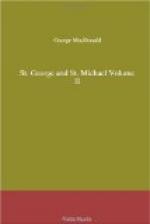One lovely evening in May, the moon at the full, the air warm yet fresh, the apple-blossoms at their largest, with as yet no spot upon their fair skin, and the nightingales singing out of their very bones, the season, the hour, the blossoms, and the moon had invaded every chamber in the castle, seized every heart of both man and beast, and turned all into one congregation of which the nightingales were the priests. The cocks were crowing as if it had been the dawn itself instead of its ghost they saw; the dogs were howling, but whether that was from love or hate of the moon, I cannot tell; the pigeons were cooing; the peacock had turned his train into a paralune, understanding well that the carnival could not be complete without him and his; and the wild beasts were restless, uttering a short yell now and then, at least aware that something was going on. All the inhabitants of the castle were out of doors, the ladies and gentlemen in groups here and there about the gardens and lawns and islands, and the domestics, and such of the garrison as were not on duty, wandering hither and thither where they pleased, careful only not to intrude on their superiors.
Lady Margaret was walking with her step-son Henry on a lawn under the northern window of the picture-gallery, and there the ladies Elizabeth and Anne joined them—the former a cheerful woman, endowed with a large share of her father’s genial temperament; joke or jest would moult no feather in lady Elizabeth’s keeping; the latter quiet, sincere, and reverent. The marquis himself, notwithstanding a slight attack of the gout, had hobbled on his stick to a chair set for him on the same lawn. Beside him sat lady Mary, younger than the other two, and specially devoted to her father.




